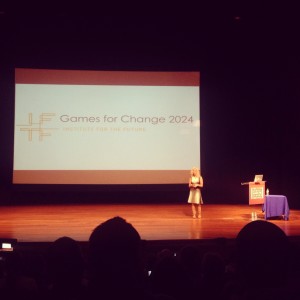Games for Social Good That We Will Play in 10 Years
Jane McGonigal (@avantgame) is a world-renowned designer of alternate reality games aimed at improving people’s lives and solving real problems. She is an inventor, researcher and author of the New York Times bestseller Reality is Broken.
Jane is also a future forecaster. She is the Director of Games Research & Development at the Institute for the Future, a non-profit research group in Palo Alto, California. She can be seen in-person and on stage at our upcoming GSummit in San Francisco this June 10-13.
Jane currently serves on the Board of Directors for Games for Change (@G4C), and on April 22 she was invited to open the 11th annual Games For Change Festival in New York to speak on what the social good organization will be celebrating 10 years from now. Her future research focuses on how games are transforming the way we lead our real lives, and how they can be used to increase our resilience and well-being. To date, her future forecasting work has been featured in The Economist, Vanity Fair, The New Yorker, O(prah) Magazine, Fast Company, The New York Times Science section, and more.
Jane’s #1 goal in life is to see a game designer win a Nobel Peace Prize, which, she predicts, will happen by 2023. While in 2014 it is still perceived as a (crazy) job of the future, Jane knows what she is talking about, having created and deployed award-winning games, sports and secret missions in more than 30 countries on six continents for partners such as the American Heart Association, the International Olympics Committee, the World Bank Institute, and the New York Public Library. Jane specializes in games that challenge players to tackle real-world problems, such as poverty, hunger and climate change. Her best-known work includes EVOKE, Superstruct, World Without Oil, Cruel 2 B Kind, Find the Future, and The Lost Ring.
Jane invites us to think about the best social good games of the future as blockbuster engaging experiences that blend known and emerging technologies and trends to create truly global and life-changing impact.
Future with a Taste of Jelly Beans
Jane believes game designers are on a humanitarian mission, and, in 10 years’ time, much of what is new and innovative today will change the core of the most basic and popular rituals and traditions we have to for a more fulfilling and successful life.
Jane calls these emerging trends and technologies, which she thinks will be part of our future, “signals ” – and makes an analogy with jelly beans that, when eaten in certain combinations, create a completely new flavor. She invites us to think about the future in a similar way – combining signals like jelly beans to come up with the potential overall taste.

While game designers are not (yet) celebrated like movie stars, Jane presents her own (Oscar) nominees for the Games of Change 2024 Awards based on what signals – or jelly beans – are all the rage in 2014. For example, Jane predicts that the success of save-to-win savings accounts and the psychology of dopamine priming will come together in a vision where governments gamify the well-known state lotteries and donate the remainder of the prize to fight income inequality.
Jane also acknowledges the huge interest that 3D printing is currently generating, as well as the Oculus Rift. In her view of the future, 3D printers could make healthy food, and the Oculus Rift experience would affect our perception of it. In that way, our brain could be fooled into thinking that we’re eating a cake while in reality it could be a protein mix. The perception alteration signal can be developed much further – to empathy-building virtual reality games. Jane quotes an experiment where people decreased their meat consumption after having experienced a cow’s life through a cow simulator in the virtual reality. This could have a potentially huge impact on our attitude towards animals and diets. Another possibility for using the Oculus Rift signal is to democratize the memoir. A person could experience another person’s life through the Oculus Rift experience, and write about them without having to interview them or even meet in person!
Jane also hopes we will be healthier and more active in the future, driven by the wave of personal fitness trackers like Nike+ and Google Glass. However, many of them are abandoned within the first 6 months. While the aim of wearables is to make us healthier, we rely on them to keep us engaged over time – something that game creators like Zombies, Run! and other augmented reality game developers understand. What might be lacking, as suggested by Jane, is team effort. Many people watch team sports, many purchase branded T-shirts and gear, and spend a lot of time and money overall on following and cheering for their team. When faced with these jelly bean signals, Jane suggests that Nike+ could reinvent professional sports like the NFL by allowing people to influence their real-life teams through collective exercise. If, say, NY Giants fans got together and ran a certain amount of miles, they could then enhance their team’s performance in the game – be it real or virtual like Madden NFL.
The last jelly bean flavor – and flavor that won the hearts of the Games for Change audience in a nomination vote – is Jane’s own fictional Socrates 2.0 education platform. College students today get into massive debt over education that no-one can put a real-life value on. She mentions research that suggests for-profit colleges lead to defaults on student loans. At the same time we see a tremendous interest in gamification in the classrom and game-based learning. Initiatives are popping up worldwide when teachers see traditional education methods fail to engage students. Socrates 2.0 is an online education platform that would crowdsource education much like Wikistrat crowdsources consulting. A student would be matched with a mentor for every subject she takes, and guided through both educational material and its application in real life by sending the student to local meetup groups, companies and professional organizations. We can also imagine referring the student to additional learning materials that would not be forgotten on the last page of course syllabus, but would make the student search for the necessary resources in libraries, government institutions, etc. In essence, Socrates 2.0 would teach a student how to learn throughout their lives, instead of cramming short-term facts and, most importantly, expose her to the current situation in her area of studies.
Fail break
Finally, Jane asks you to suggest the overall jelly bean ‘flavor’ for the following signals that many people like, but she has not come up with a social good game for. Is there a social game flavor for the following signals?
- LED light installations on buildings that could entertain people around the world for holidays and big events like the Super Bowl;
- World’s biggest crowdsourced Pokemon game in Twitch;
- Tetris game on a Philadelphia building.
Share any comments and tweet to Jane at @avantgame with your suggestions!
Catch Jane at GSummit in San Francisco!
Jane enjoys speaking to global audiences and has appeared at TED and the New Yorker Conference, keynoted SXSW interactive, the Game Developers Conference, the Idea Festival, the National Association of Broadcasters, the Web 2.0 Summit, UX Week, Webstock, and more.
At GSummit, Jane will give a talk on The Science of How Games Make Us Stronger. It is not enough to make games that can change people’s lives for the better – we have to measure that change. Dr. McGonigal will share news from her NIH-funded clinical trial and results from a University of Pennsylvania randomized controlled trial of her latest game.
Come to GSummit, June 10-13 in San Francisco, to hear Jane and 50+ other amazing speakers on the topics of user engagement (consumer + employee), social change, customer loyalty, behavior design & gamification! Register today!








